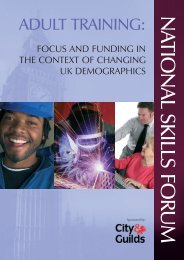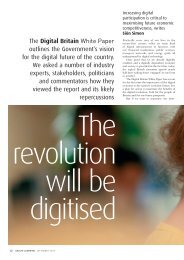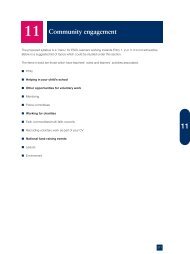Section 11: Volunteering and citizenship - [PDF File] - Niace
Section 11: Volunteering and citizenship - [PDF File] - Niace
Section 11: Volunteering and citizenship - [PDF File] - Niace
You also want an ePaper? Increase the reach of your titles
YUMPU automatically turns print PDFs into web optimized ePapers that Google loves.
<strong>11</strong><strong>Volunteering</strong> <strong>and</strong> <strong>citizenship</strong>The proposed syllabus is a ‘menu’ for ESOL learners working towards Entry 1, 2 or 3. It is not exhaustive.Below is a suggested list of topics which could be studied under this section.The items in bold are those which have teachers’ notes <strong>and</strong> learners’ activities associated.n What is volunteering?n <strong>Volunteering</strong> <strong>and</strong> active <strong>citizenship</strong>n Choosing volunteer activitiesn Becoming a volunteern Supporting learners in volunteeringn Local community organisationsn Parent Teacher Associations (PTAs)n Mentoring<strong>11</strong>n Police committees■n Working for charitiesn Recording voluntary work as part of your CV271
<strong>11</strong>Sources of the material used in this sectionn www.do-it.org.ukn www.ukba.homeoffice.gov.uk<strong>Volunteering</strong> <strong>and</strong> <strong>citizenship</strong>T E A C H E R S ’ N O T E Sn www.vinspired.comSources of other useful materialn Leaflets from a local volunteer bureau.n Skills for Life learner materials pack, ESOL E3, unit 7: ‘Local communities’.n A video of an Iranian asylum seeker living in Bradford talking about her life <strong>and</strong> voluntary work, ‘One dayin May’: www.youtube.com/watch?v=PGMw1YB9nx4&feature=channeln Video about the consultation on earned <strong>citizenship</strong>, including a short clip of a teacher <strong>and</strong> her ESOLclass: www.youtube.com/watch?v=SwQugH6GkW8&feature=channeln Citizenship materials for ESOL learners pack, unit 13: ‘Getting involved in your community’.n Cambridge ESOL Activities, Entry 1, 2 <strong>and</strong> 3. Cambridge University Press, 2008. Photocopiable activitieson <strong>citizenship</strong> themes: www.cambridge.org/elt/esol.Updated for 2010273
Citizenship materials for ESOL learnersT E A C H E R S ’ N O T E SUseful WebsitesWebsite Web address DescriptionCSV www.csv.org.uk/?display=volunteering A national volunteering <strong>and</strong> training charity.Information on many different kinds ofvolunteering opportunities with links to morespecific information, <strong>and</strong> an interactive mapto find local opportunities. Information on freetraining opportunities nationwide.CommunityDo-it!www.do-it.org.ukA huge database on volunteering opportunitiesthroughout the UK <strong>and</strong> overseas, based oninformation from local volunteer bureaux. Achance to browse through local opportunities.Home OfficeBorder AgencyNationalConfederation ofParent TeacherAssociations(NCPTA)www.ukba.homeoffice.gov.ukwww.ncpta.org.ukInformation on the new regulations, requirements<strong>and</strong> processes involved in earning <strong>citizenship</strong> inthe UK.A national charity representing over 13,000 PTAsacross Engl<strong>and</strong>, Wales <strong>and</strong> Northern Irel<strong>and</strong>.Timebank www.timebank.org.uk A volunteering promotion site.Vinspired www.vinspired.com Information about volunteering opportunities inEngl<strong>and</strong> for young people aged 16–25. Includesopportunities for disadvantaged young people<strong>and</strong> promotes youth leadership.<strong>Volunteering</strong>Engl<strong>and</strong>www.volunteering.org.ukA volunteer development agency promotingvolunteering as a powerful tool for change.EnvironmentFriends of theEarthwww.foe.co.uk/campaigns/local_groups_<strong>and</strong>_campaignsOpportunities to work as a volunteer at local <strong>and</strong>national levels.Greenpeace www.greenpeace.org/international Opportunities to work as a volunteer at local <strong>and</strong>national levels.Worldwide Fundfor Naturewww.wwf.org.ukOpportunities to work as a volunteer at local <strong>and</strong>national levels.Human rightsAmnestyInternationalwww.amnesty.org.uk/action/localgroups Opportunities to work as a volunteer at local <strong>and</strong>national levels.Oxfamwww.oxfam.org.uk/resources/faq/volunteering.htmlwww.oxfam.org.uk/get_involved/volunteer/index.htmlInformation on volunteer opportunities at Oxfam,including information on work permits.Information on how to apply to volunteer to workin an Oxfam shop or other events.Animal rightsRSPB www.rspb.org.uk This organisation works to help secure safeenvironments for birds <strong>and</strong> wildlife.RSPCA www.rspca.org.uk Information about animal care, pet care sheets,recipes, local <strong>and</strong> international RSPCA organisations.274Updated for 2010
<strong>Section</strong> <strong>11</strong>: <strong>Volunteering</strong> <strong>and</strong> <strong>citizenship</strong>Type of resource Online or downloaded? Level/adaptabilityText-based interactive resource, with linksto videos of volunteers. Very clearly setout.Interesting section ‘ask the site’ –www.thesite.org/community/askthesiteQuestions posed by young people areanswered by trained volunteers. Deals withissues such as welfare, houses, health, legalrights.Text-based resource with information on thenew regulations.Online – interactive <strong>and</strong> useful for finding outabout local opportunities/vacancies.Online search engine to search for types ofvolunteering <strong>and</strong> local opportunities.Online.E1+With help, E1Teachers’ resource,adaptation necessaryT E A C H E R S ’ N O T E SText-based with articles, news <strong>and</strong> regionaleventsOnline, with links to fundraising ideas <strong>and</strong>posters.With help, E1+Information about campaigns, frequently askedquestions, celebrity quotes, <strong>and</strong> so on.Text-based website with interactive onlineforums, pictures <strong>and</strong> video.Online. E1+Online – interactive <strong>and</strong> useful for finding localvinvolved team.Simple,straightforwardtext. E1+Articles, news <strong>and</strong> events on volunteering,mostly text.Ideas of what to volunteer for; names ofcharities in the UK <strong>and</strong> abroad, residential aswell.High E1+Text based in general – success stories hasstories about the successes <strong>and</strong> experiences oflocal groups. Also basic contact details for eachgroup.Information on volunteering <strong>and</strong> job searches,text quite advanced.Information on volunteering as an individual<strong>and</strong> joining a volunteer group.Information on what you can do <strong>and</strong> how tohelp.Text, with interactive questions <strong>and</strong> answers.Very clearly set out.Online search engine to find a local group viayour postcode. Lots of online resources./photosvideos – photos <strong>and</strong> video clips ofGreenpeace activists <strong>and</strong> their campaigns.Information on endangered species online.Online A–Z of local groups.Online – interactive <strong>and</strong> useful for findingout how to become a volunteer <strong>and</strong> currentvolunteer opportunities/vacancies.E2+E2+Short chunks oftext, high E1+Large text, quitesimple, E1+E2+Text-based site. Vacancies for volunteeringavailable.Lots of text on stories of animal cruelty.Possible to listen to bird song online. E2+Pictures <strong>and</strong> Webcams online too.Text to download. ‘Playpen’ has online Low E2+activities directed at children but suitable forsome ESOL adult learners.All details were correct at time of publication.Updated for 2010275
Citizenship materials for ESOL learnersT E A C H E R S ’ N O T E S<strong>11</strong>.1What is volunteering?Entry 1 Entry 2 Entry 3Listen to people talking aboutvolunteering.(Lr/E1.1b; Lr/E1.2a)Listen to people talking aboutvolunteering.(Lr/E2.1b; Lr/E2.2a)Scan text <strong>and</strong> extract keyinformation. (Rt/E3.7a, Rt/E3.8a)Suggested procedurePart 1 (Entry 1/2)■ Elicit what learners know about volunteering<strong>and</strong> pre-teach key words, such as charityshop, disabled, church, treasurer. Clarify thatit means working for no money.■ Ask learners to compile a list of differentkinds of volunteer activities they have done inEngl<strong>and</strong> or in other countries.■ Record the statements on the opposite page<strong>and</strong> play the recording several times (or readthem aloud). Learners listen <strong>and</strong> tick any ofthe volunteer activities they talked about.■ Feedback: check answers.■ Ask learners to listen again <strong>and</strong> note thereasons each person gives for volunteering<strong>and</strong> what they gain from the experience.■ Feedback: discuss answers as a whole group<strong>and</strong> clarify that ‘volunteering’ can be eithera structured, more formal activity (such asworking for a large organisation like the RedCross) or an informal, ‘helping’ activity (suchas helping with community festivals or goingto the doctor with a neighbour).Part 2 (Entry 3)■ Cut up the cards on p.279 <strong>and</strong> give a set toeach pair/group of learners.■ Ask learners to read the case study about Elaon p.278 <strong>and</strong> arrange the cards into a table,based on the events described in the text.■ Check answers <strong>and</strong> ask learners to createsentences using the cards – orally or inwriting.Differentiation■ Learners with stronger literacy skills can workwith learners with weaker literacy skills.■ Learners who speak the same language couldwork together.■ Some learners can read the statements whilelistening to them.■ As an alternative to the cards activity,the table on p.279 can have some of theinformation removed so that learners read thetext in order to complete the table with themissing information.Language pointsIntegrate the following specific language points:■ present simple tense (including third personsingular);■ past simple tense.Extension activities■ In small groups, learners create a posteror visual to explore volunteer activities. AReflect approach could be used. For detailsof this approach go to: www.reflect-action.org/?q=node/41■ Watch the video of an Iranian asylum seekerliving in Bradford talking about her life <strong>and</strong>voluntary work, ‘One day in May’:www.youtube.com/watch?v=PGMw1YB9nx4&feature=channel■ Learners recreate Ela’s text using the cards asprompts.Additional materials needed■ Pictures of people engaged in voluntaryactivities.276Updated for 2010
<strong>Section</strong> <strong>11</strong>: <strong>Volunteering</strong> <strong>and</strong> <strong>citizenship</strong>What is volunteering? <strong>11</strong>.1Tape scriptMarek, LondonI’m on the tea <strong>and</strong> coffee rota in my church. I really enjoy doing it as I’ve got toknow so many people. As a result I feel very much part of the church <strong>and</strong> localcommunity now.L E A R N E R s ’ a c t i v i t yAnna, WalesI volunteer in a Red Cross charity shop every Saturday. I love it as it gets meout of the house, <strong>and</strong> I meet lots of people <strong>and</strong> keep in touch with all thelocal news.Yasmin, KentI visit an old lady in her home once a week for an hour or two. We sit <strong>and</strong>talk. I’ve got to know her <strong>and</strong> her family, <strong>and</strong> what life was like in Engl<strong>and</strong>when she was young. It’s given me another family <strong>and</strong> it’s wonderful.Mehmet, YorkshireEvery Friday evening I drive disabled children to their social club. It gives mesuch great pleasure, every week, when I see their smiles when they meettheir friends.Fatima, LeedsI’m the treasurer of our community group. I’m pleased I volunteered for thisas it keeps my brain active <strong>and</strong> I love keeping ‘the books’ in order.Updated for 2010277
Citizenship materials for ESOL learnersL E A R N E R s ’ a c t i v i t y<strong>11</strong>.1Case StudyWhat is volunteering?Ela Mitra was born in Lucknow in Indiaon 14 February 1922. She first visitedEngl<strong>and</strong> as a young bride in 1937, theyear of the coronation of King GeorgeVI. Even now, at age 88, Ela clearlyremembers joining the crowds along theMall <strong>and</strong> glimpsing the Queen Mother inher gown <strong>and</strong> tiara on that special day!When Ela was in her early forties, shereturned to Engl<strong>and</strong> with her husb<strong>and</strong>,to help take care of their newborngr<strong>and</strong>son while his parents werecompleting their studies at CambridgeUniversity. Since then, Ela has made herhome in Cambridge <strong>and</strong> has becomea much loved <strong>and</strong> respected memberof the community there. From makingfriends with the mums who took theirchildren to the playschool that hergr<strong>and</strong>son attended, to befriending students from overseas in need of mothering, Ela hasalways made every effort to join in the life of her neighbourhood <strong>and</strong> community. Dressedalways in a traditional sari, she serves tasty home-cooked Indian dishes <strong>and</strong> shares herreligion <strong>and</strong> heritage culture with others. Ela is a good example of how to live a fulfillingmulticultural life – when visitors come, there is always Indian halva, but also Madeiracake or scones that she bakes at home, learned many years ago from an elderly Englishneighbour.Ela began volunteering in her local hospital in 1977, supporting parents <strong>and</strong> children in thechildren’s transplant wing. She says that her 30 years <strong>and</strong> 2 months of volunteering werevery rewarding! She made friends, cared for some very sick children <strong>and</strong> their anxiousrelatives <strong>and</strong> interpreted for others when necessary. She also attended many of thetraining events at the hospital. It was only because she had to have a major operation thatEla reluctantly gave up volunteering in May 2007.The good news is that the annual volunteers’ lunch is now held at Ela’s house, so she’snot missing out!278Updated for 2010
<strong>Section</strong> <strong>11</strong>: <strong>Volunteering</strong> <strong>and</strong> <strong>citizenship</strong>What is volunteering? <strong>11</strong>.1CardsWhen? What did Ela do? Where? More information1922 She was born Lucknow, IndiaL E A R N E R s ’ a c t i v i t y1937 Her first visit toEngl<strong>and</strong>London, Engl<strong>and</strong>Coronation ofKing George VI1960s She settled in Engl<strong>and</strong> Cambridge She helped care for hergr<strong>and</strong>son1960sShe made friends withlocal mumsCambridgeThe mums had childrenat the same school as hergr<strong>and</strong>son1977 She beganvolunteeringThe local hospitalShe cared for sick children2007 She stoppedvolunteeringThe local hospitalShe became ill2009 Volunteers’ lunch Ela’s house She has lunch with all herfriendsUpdated for 2010279
Citizenship materials for ESOL learnersT E A C H E R S ’ N O T E S<strong>11</strong>.2<strong>Volunteering</strong> <strong>and</strong> active <strong>citizenship</strong>Entry 1 Entry 2 Entry 3Read <strong>and</strong> pronounce somekey words relating to active<strong>citizenship</strong>. (Rw/E1.1a; Sc/E1.1)Talk about the new regulations.(Sd/E1.1c)Read <strong>and</strong> underst<strong>and</strong> a textabout active <strong>citizenship</strong>.(Rt/E2.1b)Develop vocabulary relating to<strong>citizenship</strong>. (Rw/E2.2a)Express views <strong>and</strong> opinions.(Sd/E2.1d)Read <strong>and</strong> underst<strong>and</strong> a text aboutactive <strong>citizenship</strong>. (Rt/E3.1a)Develop vocabulary relating to<strong>citizenship</strong>. (Rw/E3.1a)Express views <strong>and</strong> opinions.(Sd/E3.1d)Suggested procedure (Entry 2/3)■ Ask learners to discuss what they knowabout 'active <strong>citizenship</strong>'.■ Feedback <strong>and</strong> point out that volunteering<strong>and</strong> being ‘active citizens’ may helpapplicants to gain <strong>citizenship</strong> more quickly.■ Ask the learners to do the matching exerciseon p.281. Drill words <strong>and</strong> check answers.■ Before learners read the text, ask themwhat kind of activities they think woulddemonstrate ‘active <strong>citizenship</strong>’. Clarifythat voluntary work can be: (a) ‘formal’ <strong>and</strong>happen on a regular basis, such as with alarge organisation, with training, support,etc. or (b) ‘informal’ activities which takeplace from time to time, such as doing aneighbour’s shopping, helping at a schoolfete, etc.■ Use this as an opportunity to pre-teach/check ‘heritage’, ‘society’, ‘environment’,‘befriending’ etc.■ Ask learners to work individually or in pairs toread the text <strong>and</strong> see if any of the activitiesthey thought of are mentioned.■ Ask learners to look at the categories onp.283 <strong>and</strong> complete the task. Learnerscompare their answers.■ Feedback: check answers.■ Ask learners to discuss the questions.Explain that volunteering for a largeorganisation (such as CSV), getting itrecorded <strong>and</strong> obtaining a reference may helpan application for <strong>citizenship</strong>.Differentiation■ Less able learners can work with strongerlearners.■ Learners who speak the same languagecould work together.■ Stronger learners can add their own ideas tothe categories.■ Stronger readers can read the original pageon the Internet.■ Allow dictionaries.Language pointsIntegrate the following specific language points:■ use of ‘might’, ‘will’, ‘would’, ‘wouldn’t’;■ relative clauses <strong>and</strong> use of third personsingular;■ focus on prepositions, for example, ‘takepart in’, ‘volunteer with’, ‘serve on’, ‘incontact with’;■ lexical phrases for expressing views <strong>and</strong>opinions.Extension activities■ Learners create a poster to show the rangeof volunteering activities that could beconsidered ‘active <strong>citizenship</strong>’.■ Learners go onto the Border Agencywebsite <strong>and</strong> find out about the <strong>citizenship</strong>process. They devise an information sheet orpresentation based on the information.(www.ukba.homeoffice.gov.uk)■ Learners use the Internet to find anorganisation (such as CSV or Do-it!) whichoffers volunteering opportunities relating toan activity they are interested in. Learnersselect keywords to enter into a searchengine.Additional materials needed■ Access to Internet.Answers to the activities can be found in theanswers section p.319.280Updated for 2010
<strong>Section</strong> <strong>11</strong>: <strong>Volunteering</strong> <strong>and</strong> <strong>citizenship</strong><strong>Volunteering</strong> <strong>and</strong> active <strong>citizenship</strong> <strong>11</strong>.2Match the word with its meaning1. community2. befriendinga. a relationship in which a volunteersupports someone on a personal <strong>and</strong>social levelb. become a full member of a community/societyL E A R N E R s ’ a c t i v i t y3. active <strong>citizenship</strong>c. strong feeling of belonging <strong>and</strong> loyalty4. integrated. offer to do something without beingpaid5. volunteere. a group of people who live in the samearea <strong>and</strong>/or have the same interests,religion, race, etc.6. commitmentf. becoming very involved in thecommunity by volunteeringMark the stress <strong>and</strong> number of syllables on each word. Now practise saying them clearly.Updated for 2010281
Citizenship materials for ESOL learnersL E A R N E R s ’ a c t i v i t y<strong>11</strong>.2<strong>Volunteering</strong> <strong>and</strong> active <strong>citizenship</strong>The UK Government has outlined its plans for 'Big Society', which encourages people tohave a say in local issues <strong>and</strong> to be more active in society.This is an extract from the UK Border Agency’s website on active <strong>citizenship</strong>.To demonstrate active <strong>citizenship</strong>, a migrant might volunteer with a recognisedorganisation such as a charity, serve on a community body or take part in an activitythat:n advances education or health;n advances social <strong>and</strong> community welfare;n advances heritage, arts, culture or sport;n benefits the natural environment;n benefits children, young people, elderly people, disabled people or othervulnerable groups; <strong>and</strong>/orn involves mentoring or befriending.Active <strong>citizenship</strong> will:n encourage integration, by bringing migrants into greater contact with the widercommunity so that they share values <strong>and</strong> use their English language skills;n enable would-be citizens to show commitment to the United Kingdom; <strong>and</strong>n open them up to new experiences, which could become lifelong roles.www.ukba.homeoffice.gov.uk282Updated for 2010
<strong>Section</strong> <strong>11</strong>: <strong>Volunteering</strong> <strong>and</strong> <strong>citizenship</strong><strong>Volunteering</strong> <strong>and</strong> active <strong>citizenship</strong> <strong>11</strong>.2Put each activity into the right categoryEducation <strong>and</strong>healthSocial <strong>and</strong>communityHeritage, arts,sports, cultureNaturalenvironmentChildren, youngpeopleElderly people Disabled <strong>and</strong>vulnerable peoplePicking up rubbish in an area of natural beautyVisiting a lonely person who cannot go outShowing visitors around a nearby historic houseGoing on a school outing with the children <strong>and</strong> their teacherHelping at a local football matchOrganising a street party with your neighboursHelping at a local youth clubMaking s<strong>and</strong>wiches for a homeless charityDoing your elderly neighbour’s shoppingDiscussionn Do you think ‘active <strong>citizenship</strong>’ is a good idea? Why/Why not?n Which organisations do you know that offer volunteer opportunities – in the UK or abroad?n What kind of skills could you develop by volunteering?L E A R N E R s ’ a c t i v i t yUpdated for 2010283
Citizenship materials for ESOL learnersT E A C H E R S ’ N O T E S<strong>11</strong>.3Choosing volunteer activitiesEntry 1 Entry 2 Entry 3Talk about likes <strong>and</strong> dislikes.(Sd/E1.1c)Fill in a simple form.(Wt/E1.1)Talk about likes, dislikes <strong>and</strong>wishes. (Sd/E2.1c)Complete a form accurately.(Wt/E2.1b)Take part in formal interaction,phone a volunteer bureau <strong>and</strong>give personal information.(Sd/E2.1b; Sc/E2.3b)Talk about likes, dislikes <strong>and</strong>wishes. (Sd/E3.1c)Complete a form with additionalcomments. (Wt/E3.5a)Take part in formal interaction<strong>and</strong> phone a volunteer bureau foradvice. (Sd/E3.1e; Sc/E3.2a.)Suggested procedure (Entry 2)Part 1■ Refer back to <strong>11</strong>.1 <strong>and</strong> <strong>11</strong>.2. Review the idea ofvoluntary work <strong>and</strong> establish the fact that it meansworking for no money.■ Ask learners to think of reasons why people do this,then look at the statements <strong>and</strong> see if the ideas arethe same as their own.■ Ask learners to say what they would <strong>and</strong> wouldn’tlike to do (based on p.283) <strong>and</strong>, if possible, to givereasons using the language in the statements.■ Point out the importance of collecting evidence ofvoluntary work experiences – formal <strong>and</strong> informal –when applying for a job (CV <strong>and</strong> job applications).Having recorded evidence of voluntary work <strong>and</strong>references will help when applying for <strong>citizenship</strong>,especially from large, well-known voluntaryorganisations.■ Encourage learners to talk about whether they areinterested in volunteering <strong>and</strong> what their reasonswould be.■ Ask the learners if they have had any experience ofvoluntary work (in their own country or in the UK)<strong>and</strong> what they did. Discuss how to find volunteeringopportunities in the UK (often through the Internet/Websites).■ Introduce the task on p.286 <strong>and</strong> clarify anyunknown vocabulary, for example, ‘asterisk’. Ifpossible, show learners the Do-it! website <strong>and</strong>the online version of the form: www.do-it.org.uk/profileview.do?actionType=addapply■ Ask learners to complete the form with their owndetails. They could do this activity online if theyhave access to the Internet.Differentiation■ Stronger speakers can discuss a number ofoptions, while others choose one they would like todo <strong>and</strong> talk about it briefly.■ Higher-level writers can write about their skills,qualifications <strong>and</strong> experience.Part 2■ Record the dialogue on p.287 on tape <strong>and</strong> playit several times. Ask learners comprehensionquestions, then let them read the script.■ Practise key phrases orally.■ Ask learners to work in pairs <strong>and</strong> role play a similardialogue.Differentiation■ Stronger learners can work together to write theirown dialogue. They can also play the part of thevolunteer organiser in a freer role play.Language pointsIntegrate the following specific language points:■ would <strong>and</strong> wouldn’t like to;■ giving reasons, using ‘because’;■ intonation in question forms.Extension activities■ Learners go to www.do-it.org.uk, enter their postcode <strong>and</strong> apply for a volunteering opportunity in thelocal area.■ Read leaflets from a local volunteer bureau■ Watch the video of an Iranian asylum seeker livingin Bradford talking about her life <strong>and</strong> voluntarywork, ‘One day in May’: www.youtube.com/watch?v=PGMw1YB9nx4&feature=channelAdditional materials needed■ Leaflets from a local volunteer bureau.■ Leaflets <strong>and</strong> information on a variety of volunteeringopportunities <strong>and</strong> different organisations to showthe wide range available (formal <strong>and</strong> informal).■ Access to Internet.284Updated for 2010
Citizenship materials for ESOL learnersL E A R N E R s ’ a c t i v i t y<strong>11</strong>.3Choosing volunteer activitiesCompleting an online registration formFill in the registration form with your detailsOnly fields marked with an asterisk* are m<strong>and</strong>atory.Read our privacy statement.. . . . . . . . . . . . . . . . . . . . . . . . . . . . . . . . . . . . . . . . . . . . . . . . . . . . . . . . . . . . . . . . . . . . . . .NameMr/Mrs/Miss/Dr*vFirst name*Last name*. . . . . . . . . . . . . . . . . . . . . . . . . . . . . . . . . . . . . . . . . . . . . . . . . . . . . . . . . . . . . . . . . . . . . . .Contact detailsEmail address*Confirm email address*Address Line 1Address Line 2TownCountyPostcode*Daytime Telephone*Evening TelephoneSelectvMobile. . . . . . . . . . . . . . . . . . . . . . . . . . . . . . . . . . . . . . . . . . . . . . . . . . . . . . . . . . . . . . . . . . . . . . .AvailabilityAll Morning Afternoon EveningMonTueWedThuFriSatSun. . . . . . . . . . . . . . . . . . . . . . . . . . . . . . . . . . . . . . . . . . . . . . . . . . . . . . . . . . . . . . . . . . . . . .Skills/Qualifications experienceIs there any other infoyou would like to addabout your skills orexperience.(Max 2000 characters)Adapted from: www.do-it.org.uk/profileview.do?actionType=add286Updated for 2010
<strong>Section</strong> <strong>11</strong>: <strong>Volunteering</strong> <strong>and</strong> <strong>citizenship</strong>Choosing volunteer activities <strong>11</strong>.3Tape scriptHello. Can I help you?Yes, I’m looking for work as a volunteer.We have a lot of opportunities. What are you interested in?L E A R N E R s ’ a c t i v i t yI’m not sure.What language do you speak?I speak Arabic <strong>and</strong> Kurdish.Well, I think you can volunteer in the Kurdish community centre.Yes, I know. I already do that. But really, I want to meet people <strong>and</strong> speak English.Well, we’re looking for people to help disabled people. They’re mostly English speakers.That sounds good. What can I do?Are you free on Wednesdays?Yes, I am.Every Wednesday, there’s a trip somewhere for people in wheelchairs. They go tomuseums or to parks <strong>and</strong> other places. They need people to volunteer to go with them.It’s really interesting.That sounds perfect. I can help people <strong>and</strong> speak English, <strong>and</strong> go to interesting places.Yes, I’d really like to do that.Updated for 2010287
Citizenship materials for ESOL learnersT E A C H E R S ’ N O T E S<strong>11</strong>.4Becoming a volunteerEntry 1 Entry 2 Entry 3n/aScan for key facts in a text.(Rt/E2.1b)Take part in formal interaction.(Sd/E2.1b)Skim <strong>and</strong> scan texts. (Rt/E3.6a,Rt/E3.7a)Ask questions in a formalinteraction. (Sc/E3.3b, Sd/E3.1b,Sd/E2.1b) Discussion skills.(Sd/E3.1d)Suggested procedure (Entry 3)Part 1■ Set the scene by discussing the questionof volunteering <strong>and</strong> the kinds of areas inwhich people can volunteer. Discuss formal<strong>and</strong> informal volunteering opportunities, thedifferent roles in different organisations, <strong>and</strong>where to find information about opportunities.■ Ask learners to predict what kind of workmight be done by volunteers in the area ofdisability, then ask them to skim the extractsfrom the website <strong>and</strong> find out if the ‘jobs’mentioned were predicted.■ Ask them to answer the questions <strong>and</strong>discuss the answers.■ Check/clarify key vocabulary <strong>and</strong> discuss anydifficulties.■ Elicit from learners the questions that theywould want to ask if enquiring at a volunteerbureau about one of these opportunities.Elicit the questions they think the volunteerorganiser will ask.■ Using the role cards <strong>and</strong> either a leaflet froma local volunteer bureau or extracts from awebsite, ask learners to prepare the questionsthey will ask or the information they will giveabout one of the jobs. Take care to ensurethat there is an organiser <strong>and</strong> a prospectivevolunteer for each job.■ Ask learners to pair up with the appropriatepartner <strong>and</strong> role play the telephoneconversation.Differentiation■ The website extracts could be made intocards <strong>and</strong> each section given to a differentlearner to read. Learners could then exchangeinformation about the volunteer opportunities.■ If any learners are not confident aboutspeaking, make sure they are in the role of theprospective volunteer.Part 2■ Write the terms ‘a big h<strong>and</strong>’ <strong>and</strong> ‘vinspiredawards scheme’ <strong>and</strong> ask learners to guesswhat they mean.■ Ask them to read the text on p.291 <strong>and</strong> checktheir predictions.■ Check comprehension orally.■ Ask learners to work in pairs to discuss thequestions.■ Learners practise giving advice aboutvolunteering to a young relative or friend.Language pointsIntegrate the following specific language points:■ lexis relating to volunteer opportunities <strong>and</strong>disability – hospice, special needs, befriender;■ using appropriate register for a formal enquiry;■ question formation;■ giving advice.Extension activities■ Ask learners to research another area forvolunteering on the www.do-it.org.uk website,<strong>and</strong> give a short talk about it.■ Ask learners to make a poster encouragingpeople to volunteer to support organisationsworking with disabilities.■ Ask learners to write a letter or email,introducing themselves to a voluntaryorganisation.Additional materials needed■ Leaflets from a local volunteer bureau.■ Access to Internet.288Updated for 2010
<strong>Section</strong> <strong>11</strong>: <strong>Volunteering</strong> <strong>and</strong> <strong>citizenship</strong>Becoming a volunteer <strong>11</strong>.4Website search resultsRead these extracts from the website www.do-it.org.uk <strong>and</strong> answer the questions below.LIFELITESVolunteers will help with collecting donations from the public at LondonUnderground Stations in 1 hour shifts. Funds received will go towardspurchasing <strong>and</strong> maintaining technology for 40 hospices in Engl<strong>and</strong> <strong>and</strong> Wales<strong>and</strong> will help with exp<strong>and</strong>ing our services into Scotl<strong>and</strong> <strong>and</strong> Northern Irel<strong>and</strong>.L E A R N E R s ’ a c t i v i t yCollection times <strong>and</strong> locations are:Tuesday, at London Bridge Station from...More information <strong>and</strong> contact detailsMENCAP Super Saturday groupThis is our new project based in Bath. It is a Saturday morning social club (termtime only) for special needs children aged from 5 to 18 <strong>and</strong> is funded by BBCChildren in Need. It runs from 9.30–12.30 during term time. Volunteers arerequired to support the children to join in various activities such as art, sport,cooking, dancing...<strong>and</strong> much more!More information <strong>and</strong> contact detailsBefrienderHull Churches Home from Hospital ServiceShort term visiting of people returning home from hospital, providing practical<strong>and</strong> emotional support including a range of tasks from shopping, befriending,changing stockings, referring clients to external long term services. Anopportunity to learn new skills. We offer training opportunities including anindividual/tailored mentorship programme.More information <strong>and</strong> contact detailsn Which opportunity involves collecting money?n Which opportunity involves visiting people in their own home?n Which opportunity involves helping children?n Which opportunity would you be interested in? Give your reasons.Updated for 2010289
Citizenship materials for ESOL learnersL E A R N E R s ’ a c t i v i t y<strong>11</strong>.4Becoming a volunteerRole cards1You work in a volunteer bureau. You organise volunteers.What do you say when you answer the phone?You have to give information to people who want to ………………………… (insert asuitable volunteer post).What is the important information you will give them? Look in the leaflet <strong>and</strong> try toremember the important points.2You want to volunteer as a ………………………. (insert a suitable volunteer post).You are going to telephone the volunteer bureau.What will you say first?What information do you want? What questions will you ask?290Updated for 2010
<strong>Section</strong> <strong>11</strong>: <strong>Volunteering</strong> <strong>and</strong> <strong>citizenship</strong>Becoming a volunteer <strong>11</strong>.4What do you think?Read this extract from the website http://vinspired.com/rewards/awards <strong>and</strong> discuss thequestions below.vinspired awardsIf you’re aged 16–25 <strong>and</strong> you spend your time giving ‘a big h<strong>and</strong>’ to other people,your community or the environment, you could get official recognition for theamazing voluntary work you do.L E A R N E R s ’ a c t i v i t y© Vinspired.comThe vinspired awards recognise the time you commit, the skills you develop <strong>and</strong>the difference you make through your volunteering.The vinspired awards scheme has been designed to boost your CV by showingemployers, colleges, universities <strong>and</strong> others clear evidence of what you’veachieved as a volunteer. How do I start?Any volunteer aged 16–25 in Engl<strong>and</strong> can apply for one of two vinspired awardssimply by keeping a record of their volunteering online:n vfifty, gained from completing 50 hours volunteering within 12 months;n vimpact achieved by doing a further 100 hours volunteering within 12 months.Discussionn What are the advantages of volunteering for young people? Are there anydisadvantages?n Do you think the ‘vinspired awards’ scheme is useful for a young person? Why/Whynot?n What would you say if you were advising a young friend or relative to become avolunteer? (Give at least three reasons why it would be a good idea.)Updated for 2010291
Citizenship materials for ESOL learnersT E A C H E R S ’ N O T E S<strong>11</strong>.5Supporting learners in volunteeringEntry 1 Entry 2 Entry 3n/aListen for key points inguidance for supportingvolunteers.(Lr.E2.2a)Listen for key points in guidancefor supporting volunteers.(Lr/E3.3a)Suggested procedure (Entry 3)Preparation: teachers will need to record theextract (or read it aloud) so that learners canlisten to the information. Read it in as natural away as possible. (The guidance is designed forvolunteer co-ordinators.)■ Introduction: set the scene by eliciting fromlearners what they remember/know aboutvolunteering <strong>and</strong> volunteer opportunities.Discuss what kind of voluntary work they havedone <strong>and</strong> how to find voluntary work.■ Introduce the idea of ‘support’ for volunteers(especially in large organisations). Elicitfrom learners why supporting volunteers isimportant.■ Ask learners to work in pairs/small groups todiscuss what kind of support they have had/would expect from an organisation if theywere a volunteer (for example, induction,training, mentoring). Under each heading,discuss what each aspect might include.■ H<strong>and</strong> out the true/false exercise <strong>and</strong> checkunderst<strong>and</strong>ing of the statements if necessary.■ Play the tape or read the text aloud forlearners to listen to <strong>and</strong> complete the true/false exercise. Repeat as necessary.■ Learners decide on their answers <strong>and</strong> checkwith a partner.■ Feedback <strong>and</strong> discussion.Differentiation■ Adapt the true/false exercise for stronger/weaker learners by adding more questions orsimplifying the questions.■ The activity could be used for readingcomprehension.■ The activity could be made into a ‘runningdictation’.■ The activity could be made into a question<strong>and</strong> answer activity, with one learner havingthe text <strong>and</strong> the other the questions.Language pointsIntegrate the following specific language points:■ expressing obligation with ‘should’ <strong>and</strong> ‘haveto’;■ using the ..ing form as the subject of asentence.Extension activities■ Ask learners to research organisations’training <strong>and</strong> support policies <strong>and</strong> write afactsheet for new volunteers.■ Learners choose an organisation <strong>and</strong> find outwhat support is available <strong>and</strong> if they have avolunteer ‘charter’.■ Learners who are/have been volunteers c<strong>and</strong>escribe the support they have received –orally or in writing.Additional materials needed■ Access to Internet.■ Voluntary action-Leeds volunteersupport: www.val.org.uk/<strong>PDF</strong>%20<strong>File</strong>s/VOLUNTEERING/Volunteer%20Support.pdf292Updated for 2010
<strong>Section</strong> <strong>11</strong>: <strong>Volunteering</strong> <strong>and</strong> <strong>citizenship</strong>Supporting learners in volunteering <strong>11</strong>.5True or false?Listen to the information for volunteers <strong>and</strong> decide if these statements are true or false:1. Well-trained <strong>and</strong> well-supported volunteers are good for theorganisation <strong>and</strong> the wider community.True / False2. Offering to support volunteers is optional. True / FalseL E A R N E R s ’ a c t i v i t y3. The first meeting should be friendly <strong>and</strong> informal. True / False4. All volunteers will need the same support. True / False5. The volunteer co-ordinator should keep in touchregularly with the volunteers.True / False6. Volunteers should know who to contact to ask for help or advice. True / False7. It is not necessary to arrange group meetings or social eventsfor volunteers.8. Training should be organised regularly <strong>and</strong> should be suitablefor the needs of the volunteers.9. Volunteers should know about the organisation’s Health &Safety policy.10. Volunteers have to pay for their own travel expenses <strong>and</strong> anyspecial equipment they need.True / FalseTrue / FalseTrue / FalseTrue / False<strong>11</strong>. Volunteers can join a trade union if they want to. True / False12. Volunteers should be supported all the time they are involvedin volunteering.True / FalseNow read the text <strong>and</strong> check your answers.Updated for 2010293
Citizenship materials for ESOL learnersL E A R N E R s ’ a c t i v i t y<strong>11</strong>.5Supporting learners in volunteeringGuidance for supporting volunteersOnce a volunteer has been recruited, selected <strong>and</strong> trained <strong>and</strong> is doing their jobeffectively, they become a valuable resource to an organisation.Offering support to volunteers is not only beneficial to them but it also benefits theorganisation <strong>and</strong> the client user group too. If a volunteer is trained <strong>and</strong> well-supported,they will be able to work more effectively with the users of the organisation. Other peopleoutside of the organisation may also view the organisation more favourably, so supportingvolunteers can actually benefit everyone who comes into contact with the organisation!Support for volunteers can take many forms but there are two important considerations:firstly, support is vital <strong>and</strong> necessary in meeting the needs of volunteers; secondly,supporting volunteers is a continuous process starting from the initial meeting, a warmwelcome, privacy, a cup of tea, chocolate biscuits ... <strong>and</strong> it goes on from there.Of course, some volunteers may not feel that they need support. Others will want oneto-onesupervision, peer support, ongoing training <strong>and</strong> whatever else is being offered.Flexibility is important – we need to listen to what volunteers want <strong>and</strong> enable them toassess their needs.There are three main aspects to support: first, the personal approach – keeping in regularcontact with volunteers <strong>and</strong> valuing their skills, knowledge, expertise <strong>and</strong> attributes;second, providing group <strong>and</strong> peer support – have regular volunteer support meetings <strong>and</strong>social events; third, supporting volunteers through training – make sure that the training isrelevant <strong>and</strong> appropriate.The organisation should also make sure that volunteers are covered by their policies, suchas Equal Opportunities, Health <strong>and</strong> Safety, <strong>and</strong> Insurance. Volunteers should be ableto claim out-of-pocket expenses, such as travel, <strong>and</strong> they should be provided with anyspecial clothing, equipment or tools if necessary. Volunteers should also have the right tojoin a trade union.To conclude, support for a volunteer should begin at the first point of contact <strong>and</strong>continue throughout their time spent with the organisation.(Adapted from ‘Voluntary Action-Leeds Volunteer Support’ good practice factsheetwww.val.org.uk/<strong>PDF</strong>%20<strong>File</strong>s/VOLUNTEERING/Volunteer%20Support.pdf)294Updated for 2010


![Section 11: Volunteering and citizenship - [PDF File] - Niace](https://img.yumpu.com/49993701/1/500x640/section-11-volunteering-and-citizenship-pdf-file-niace.jpg)
![NIACE Briefing Sheet2: What motivates people to learn [PDF]](https://img.yumpu.com/51410634/1/184x260/niace-briefing-sheet2-what-motivates-people-to-learn-pdf.jpg?quality=85)
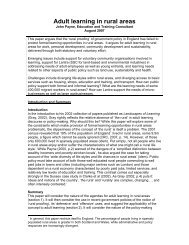
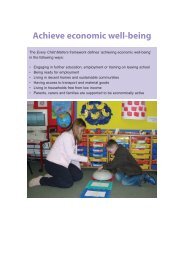
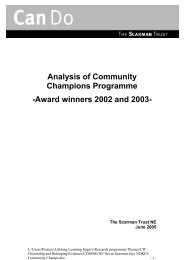

![credit card leaflet - [PDF] - Niace](https://img.yumpu.com/49256644/1/190x245/credit-card-leaflet-pdf-niace.jpg?quality=85)
![NIACE Briefing Sheet 11: Emancipatory Learning [PDF]](https://img.yumpu.com/48109261/1/184x260/niace-briefing-sheet-11-emancipatory-learning-pdf.jpg?quality=85)
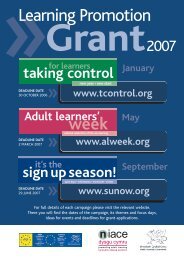
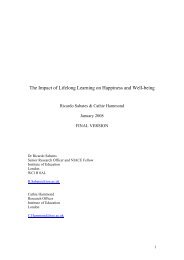
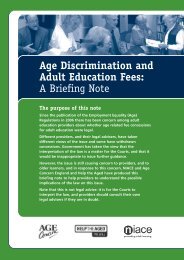
![Ice-breakers and other suggestions for your media club - [PDF] - Niace](https://img.yumpu.com/45206918/1/190x245/ice-breakers-and-other-suggestions-for-your-media-club-pdf-niace.jpg?quality=85)
